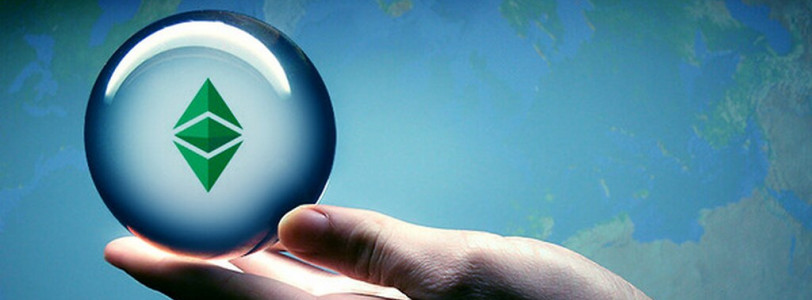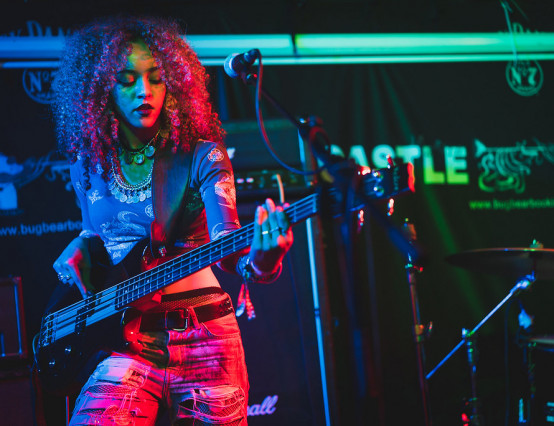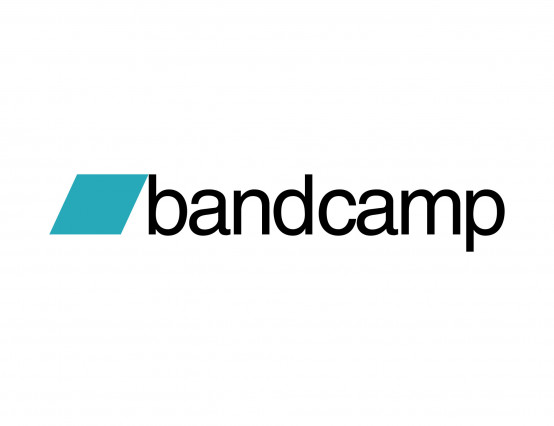The monetary success of musicians has long been determined by their record labels. Companies tend to own the majority of an artist’s discography, and any re-releases or copyright claims enforced almost always see the labels gaining profit from the music that they own, with the actual musicians seeing next to no compensation. Streaming services only compound the issue, notoriously paying next to nothing for hundreds of music streams; data shows that in both 2019 and 2020, 90% of the money generated from streaming went to the top 1% of musicians.
The music industry is ever-changing – rapidly growing and contorting in attempts to find new ways in which to make money from consumers, without ever redressing the pay disparity that leaves creatives so disadvantaged. However, new technologies present opportunities for a more equal environment. The curation of the blockchain over the past couple of years has opened up a fresh avenue in which musicians can make money from their output, and now an increasing number of artists are looking towards non-fungible tokens (NFTs) as a more lucrative way to monetise their craft.
NFTs bring about a new landscape in which artists can sell their work, allowing for fans to purchase anything from a fraction of a song to exclusive digital artwork, or photographs and collectible material from musicians. This new form of commerce allows for artists to then benefit monetarily from selling directly to their fans, mitigating the low returns that they may be getting from streaming services and record labels.
Blockchain-based music platforms such as Royal, Catalog, Opulous and Audius are gaining traction lately, as they allow for musicians to give ownership of their music and other digital assets to their fans in a mutually beneficial arrangement. The musicians themselves will see initial payment, and both fans and artists will be able to continually make money from royalties accrued by the work through blockchain trading. Artists are not looking to top charts with their songs, instead preferring to use the technology to be able to manufacture a viable financial alternative to usual music consumption, allowing them to make a living out of music – a prospect deemed nigh impossible by most.
The growth of this creator economy has seen not only optimistic interest but also wide criticism. Many question the utility of NFTs, and fear they will only serve those who are crypto-savvy and wealthy, as opposed to pioneering a new, accessible economy to the industry.
What makes NFTs worth it?
So, why should someone buy an NFT of Kings of Leon’s newest album, when they could just stream it the same day on Spotify? Well, NFTs are designed to be used as a certificate of authenticity, and work very much like trading cards. Say you manage to nab an exclusive NFT. Over time, you might see the value of that NFT increase, and decide to sell it. Unlike typical re-sales though, it’s possible for the original artist to still see monetary gain on each sale. The items are aimed at avid music collectors, the types who buy the first pressing of vinyl records or old T-shirts from their favourite band’s first tour.
Many NFT collectors will gravitate towards musicians that are already popular and have cultural capital, as a way to gain easy money through trading, leaving newer artists in a spot where they would struggle to incentivise potential buyers. Tobi Okandi, of the band O Children told the BBC: “The thing no one gets about NFTs - for musicians or otherwise - is that the true value of an NFT lies less in music or artworks but simply in power. Essentially NFTs open up a new perceived route of uniqueness and ownership”.
Digital art has been circulating for years, but music-based NFTs have recently seen an uptick in popularity as artists are discovering new ways to be creative within the format. NFTs could come in the form of minting digital assets like images, samples of songs or even whole tracks. Musicians can even mint digital tokens that equate to ownership of physical items like unique record variants, front row seats or merchandise. In essence, anything that exists, and indeed doesn’t, could possibly be made into an NFT.
The idea that independent musicians can make vast amounts of money off of the blockchain signals a huge opportunity for artists to be successful without the need for record label connections. In the era of social media and influencers, a musician can cultivate a strong fan base on their own, as long as they understand how to increase their follower counts and engage regularly with their audiences.
A service often used within crypto and NFTs is Discord. Superfans of an artist could be invited onto a Discord server to purchase an NFT, and the artist is then able to communicate directly with those who are supporting them the most. Some musicians collaborate and brainstorm ideas with these Discord communities, such as the producer Daniel Allan, who plans on offering up NFT samples that could be adapted into original music by his community.
Speaking to TIME, Allan said: “I want to be like, ‘Here are 20 demos, let’s make an EP together. There are a lot of creative people in my Discord but they haven’t necessarily had the mechanisms to be able to exercise their creativity.”
Co-founder of experimental music/art ventures Kalam Ali said in an interview with Waterandmusic that he sees NFTs “potentially creating a new kind of fan club, where NFT holders can access future drops and shows from an artist,”
“We have this new way of aggregating a fan base around something they own, in the form of a larger-scale NFT series from an artist or band. We also see the format’s creative and financial potential going hand-in-hand, such as using generative NFTs to replace merch or even tickets in virtual metaverse events.”
World renowned producer 3LAU was one of the first musicians to make big money from NFTs. In 2021 he created Royal, a marketplace in which fans can vie for ownership of music and make money off of its royalties. He believes that fans are as important to a musician’s success as the artists themselves, previously stating, “I always tell people that artists’ popularity is completely dependent on the fans and the listeners, not the companies and the distributors. If the fans like the music, they share it, they go to the shows, they're fully responsible for augmenting an artist’s popularity.”
NFT music marketplaces could also grow in tandem with digital concerts. Epic and Roblox are already experimenting with ‘metaverse’ concerts, and NFTs could effectively replace merchandising in digital settings. This has already led to huge investments into NFT artists, as big companies vye to be at the forefront of a changing industry.
NFT criticism and climate costs
Benn Jordan, a reputable music industry insider and content creator, said to prospective NFT musicians: Music and blockchain will almost certainly be married together in a much more fruitful and beneficial way in the future…But, if you haven’t noticed, the planet you live on is on fire so, wait a second – like, a month.”
The caveats of NFTs are undoubtedly something to consider though. They widely are known for their large environmental impact, as there is an obscenely large amount of computer power required to keep the blockchain up and running. Other problems include the cost of minting an NFT, the unpredictable transaction fees, and the risk of fraudulent behaviour, as there are currently no consumer protection watchdogs for the market. Questions can be raised as to whether the option is even financially feasible for upcoming artists, or if it will ultimately just end up supporting more established artists.
Ethereum is the cryptocurrency most widely used to attain NFTs, and will soon be launching Ethereum 2.0 currency in an attempt to address the environmental impact of bitmining. The reimagining of the blockchain will involve users taking part through a ‘proof of stake’ model, where instead of paying for the energy usage and computer power to be a part of the blockchain, they can instead lock some of their cryptocurrency into the chain to prove that they have a stake in keeping the network’s ledger accurate. This mitigates the need to have so many computers solving puzzles within the system, as it will be authorised instead by validators who have a financial incentive for it to be accurate.
The old proof of work model saw miners competing with each other through computer farms to create new blocks, with proof of stake, they can only create new blocks when chosen, and otherwise validate other blocks when not. Once launched, the blockchain will supposedly work in a much more climate-friendly capacity, which may increase the likelihood of more users getting involved.
Musicians like Brian Eno have expressed concerns around NFTs. In an interview with The Verge, Eno said: “I am not sure what is being brought into the world that makes any difference to anything other than some strings of numbers moving about in some bank accounts,” adding, “People I like and trust are convinced they’re the best thing since sliced bread, so I wish I could have a more positive view, but right now, I mainly see hustlers looking for suckers.”
As it stands, NFTs are an interesting prospect and an exciting new way for musicians to make money, but currently only really serve established influencers who have more funds, and who are less worried about their climate impact. When Ethereum 2.0 comes around, the landscape will shift, and it will hopefully lead to an industry that’s fairer and more equitable. This could make it much easier for fledgling artists to try and make a name for themselves.
But proclamations that a new technology will save the music industry come around like clockwork, and it’s hard to say yet whether the blockchain will breathe a new life into the music industry. However, it does seem like a lucrative way to make money within a cut-throat business, and at a time when touring is up in the air, and streaming cannot sustain an artist, it makes big promises of being a valuable tool for musicians looking to make a living doing what they do best. Record labels hold less power than ever before in music distribution, and technological advancements such as the NFT marketplace can help musicians further separate themselves from corporations and independently build their brand around a community that wants to support them.









0 Comments